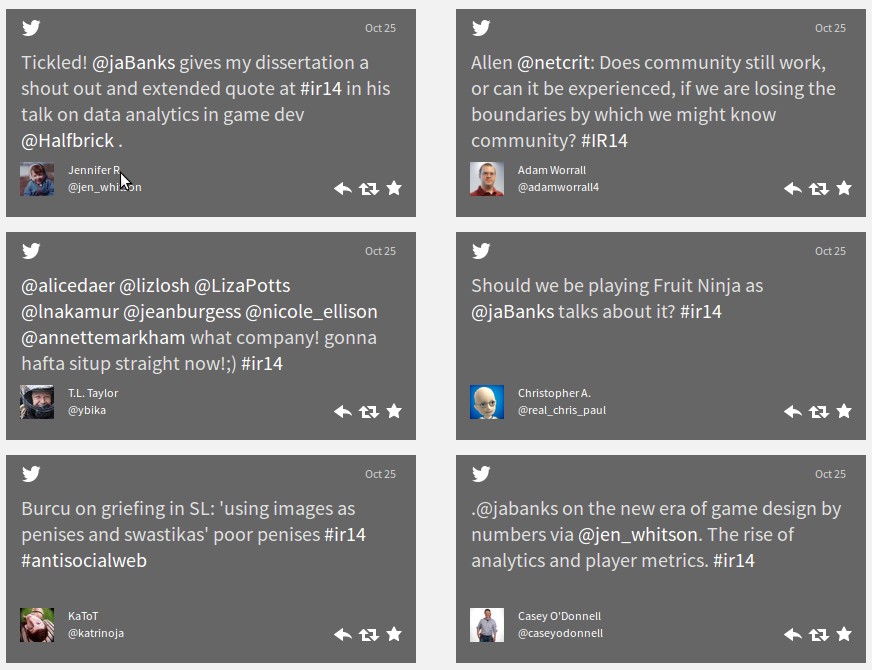This should be a summary of the interesting talks that I saw at AOIR in Denver last week. There were a lot of them. Shira Chess‘ work on Hidden Object Games, Kelly Bergstrom’s work in general (she was on a few panels), and the entire “Watching the Watchers” and “Power and Game Design” panels were the best presentations I’ve seen all year, hands down. But I’m just going to cut to the chase and offer some entirely unsolicited advice for any grad students out there. In a nutshell, don’t do what I did.
In terms of game studies, this has been a year of firsts for me. Until this year, I’ve never been to a DiGRA, AOIR or FDG conference. It makes sense – with $1000 flights and $300 registration fees, shelling out a couple grand to travel to Crete or even Denver is deadly for a student budget and is murder on your writing schedule. And so, I’ve just not gone. Here’s the issue – while I laughed over the piles of money I was saving – going to conferences is what will get you a job. It’s not going to be your writing, at least not on its own. Very few people are going to spend time reading your papers unless they’ve met you first or have seen you speak in person. So….if you want to get your work out there and build a career, you’re going to have to get out to conferences and hustle. More importantly, you have to go to the conferences that define your field, not just the ones closest to your city. And it’s going to be awkward.
If you’re like me and prefer hermitting over pressing up against teeming hordes of complete strangers, this isn’t going to be a cakewalk. I found FDG painful as I only knew two people there. And, other than meeting Lina Eklund and few people from ITU, I thought the conference was a bust in terms of the papers. But I saw many of the same people at DiGRA, and again at AOIR. It might take a few conferences for them to decide that you aren’t (just) a creepy stalker, but have patience. As a bonus, AOIR isn’t just focused on games, and so you’ll see the same people migrating to all the game panels and can follow them out to lunch/dinner/drinks. This smaller community made it waaaay easier to socialize (and also to see what’s happening in the world outside of games). So, if I had to choose just one conference to go to, I would choose AOIR over DiGRA and FDG.
The game studies community pretty much is encapsulated in these three conferences. So, if you want to know what people are working on two years before it’s published, go. If you’re writing your thesis, and want to know about other people who have beaten you to your conclusions (or better, yet, who complement your work), go. If you want to see where you stand academically, go. If you want to test out ideas with an audience of experts and figure out what readings you’ve missed, go. If you want people like Aphra Kerr, TL Taylor, Hector Postigo, Lisa Nakamura, and Mia Consalvo to hear about your work, go. If you want to have lunch or a drink with the rock-god game scholars you’ve read in your undergrad, go. If you want to hear about what cool jobs might be waiting for you and talk directly to those hiring, go. Most importantly, if you want to finally meet “your people” -those who are doing similar work, want to collaborate with you, and make you feel that you finally belong in this field, this may be the only place in the world to find them, so go. These are all things that are commonplace at conferences, but rare everywhere else.
This all seems pretty obvious. But it wasn’t to me. I started my PhD as a criminologist/surveillance studies person. It took me a long time to figure out just what game studies was, and to be able to tell the good scholarship from the bad. In retrospect, if I had simply lurked at conferences for a summer early in my fieldwork, I could have saved months and months of trying to find resources as a relatively isolated grad student. Hell, I hadn’t even heard of DiGRA (and all their cutting-edge papers) until I had been in game studies for a few years. I didn’t even know about these conferences. And, because I wasn’t hanging around enough game studies people at conferences, I didn’t pick up all this knowledge though osmosis. I didn’t know what I didn’t know, and there was nobody around to tell me. My PhD took longer than it should have, and it felt pretty darn lonely at times.
So, here I am, offering unsolicited advice: if you want to have a career in game studies or just to find a community of people who inspire you, save yourself some time and get out there to some of the larger game studies conferences early in your career. Please don’t leave it till the last minute.
And, if you find some novel ways to pay for said conferences, let me know.

